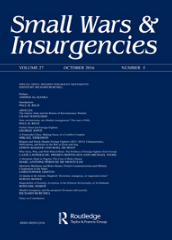Small Wars & Insurgencies provides an international and interdisciplinary forum for the academic and scholarly discussion of the historical, political, social, economic and psychological aspects of insurgency, counter-insurgency, limited war and irregular warfare. Peer-reviewed and long-established, Small Wars & Insurgencies invites papers concerned with, but not limited to, the following areas:
• insurgencies and guerrilla conflicts past and present
• counterinsurgencies including national doctrines
• terrorist movements and ideologies
• irregular warfare and the debates on its historiography
• peacekeeping and “humanitarian intervention”.
Essential reading, Small Wars & Insurgencies facilitates the discussion of historians, political scientists and students of International Relations and Security Studies on theoretical and practical issues related to the past, present and future of this critical area of both international and domestic politics. The journal is historically focused and is keen to see contributions from scholars using primary and archival sources, as well as interviews. It also welcomes contributions investigating media, literary and cinema representations of insurgencies, counter-insurgencies and irregular warfare. Most issues include an authoritative review section, and the journal’s policy is to have 2–3 special issues each year devoted to specific themes and issues, often edited by guest editors.
Members:
Resources
Displaying 1 - 1 of 1Human Capital, Natural Resource Scarcity, and the Rwandan Genocide
Many authors contend that ethnic extremism coupled with political manipulation were the primary factors behind the Rwandan genocide. Yet, to oversimplify the cause of this tragedy makes one blind to the complicated nexus that generated the outcome. Even though this genocide was quick in its execution, the events that lead to this massacre took years to unfold. We argue that the evolution of human capital and the competition for scarce resources contributed to the genocide.


